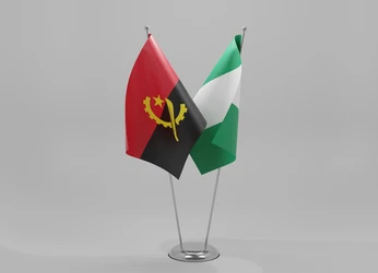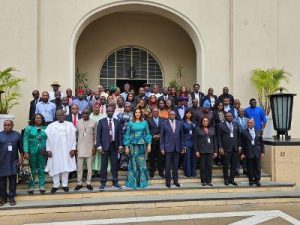Nigeria, Angola Set to Seal 15 Strategic MOUs as Bilateral Commission Resumes After Two Decades

Nigeria and Angola are preparing to sign at least 15 landmark Memoranda of Understanding (MOUs) as the 5th session of the Nigeria–Angola Bilateral Economic Joint Commission (BEJC) opened in Luanda on Tuesday. The agreements, spanning security, defence, migration, education, finance, and resource management, mark a significant turning point in relations between Africa’s two largest oil producers.

Nigeria’s Minister of State for Foreign Affairs, Ambassador Bianca Odumegwu-Ojukwu, described the agreements as “a major leap in redefining strategic cooperation,” adding that they would not only strengthen government-to-government ties but also open new channels for private sector engagement, social development, and humanitarian collaboration.
A Business and Economic Pivot: One of the most anticipated outcomes is the creation of a Nigeria-Angola Business Council, expected to provide a structured platform for trade, investment, and joint ventures. Both countries, heavily reliant on oil, are seeking to diversify into mining, land transport, and industrial processing. Draft MOUs also cover tax cooperation to prevent double taxation and allow Nigerian banks to commence operations in Angola: a move that could accelerate cross-border investment and deepen financial integration in the sub-region.
Air connectivity is also on the agenda, with deliberations ongoing for Nigerian airlines to begin direct flights to Angola, boosting tourism, business travel, and cultural exchange.
Government Services and Institutional Strengthening: The agreements go beyond economics, touching on governance and institution-building. Cooperation in fighting corruption, strengthening policing, and reforming correctional services reflects a shared recognition of domestic challenges. These measures could help modernize justice systems, enhance transparency, and restore citizen trust in government institutions.
Migration management and prisoner transfer agreements are also being finalized, signaling a humanitarian dimension. They are designed to ensure that migration is better regulated and that the rights of incarcerated nationals are protected under humane conditions.
Political and Strategic Dimensions: Politically, the resuscitation of the BEJC after over 20 years that the last session was held in Abuja in 2001, sends a message of renewed Pan-African solidarity. Nigeria and Angola share a liberation history: Nigeria strongly supported Angola’s independence struggle and recognized the MPLA in the 1970s. Today, the two countries are seeking to translate that political solidarity into concrete development gains.
On the security front, both sides are looking at joint efforts in intelligence-sharing, defence cooperation and counter-narcotics operations, which are crucial in a region where transnational crime and instability often cross porous borders.

Humanitarian and Social Cooperation: Education, youth empowerment, and cultural exchange are also central to the agreements. Plans for tertiary education collaboration, technical manpower assistance, and youth development projects show an emphasis on long-term human capital growth. Health partnerships, particularly in medical sciences, have the potential to improve public healthcare systems in both countries.
The twinning arrangements between Nigerian states (Bayelsa and Nasarawa) and Angolan provinces (Namibe and Bengo) are noteworthy. They extend cooperation to the sub-national level, creating people-to-people linkages that can foster grassroots development and strengthen community diplomacy.
A New Era of Engagement: Ambassador Odumegwu-Ojukwu emphasized that the reactivation of the Joint Commission is not merely symbolic but a reflection of determination to revive dormant agreements and expand into new frontiers. “This is about building capacity, unlocking shared prosperity, and positioning our nations as stronger partners in Africa’s economic, political, and social future,” she said.
As both nations finalize the MOUs, the outcomes could reshape not just bilateral relations but also the broader dynamics of African cooperation, bridging government, business and humanitarian goals under one strategic framework.






